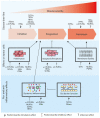The Modulatory Effects of Fatty Acids on Cancer Progression
- PMID: 36830818
- PMCID: PMC9953116
- DOI: 10.3390/biomedicines11020280
The Modulatory Effects of Fatty Acids on Cancer Progression
Abstract
Cancer is the second leading cause of death worldwide and the global cancer burden rises rapidly. The risk factors for cancer development can often be attributed to lifestyle factors, of which an unhealthy diet is a major contributor. Dietary fat is an important macronutrient and therefore a crucial part of a well-balanced and healthy diet, but it is still unclear which specific fatty acids contribute to a healthy and well-balanced diet in the context of cancer risk and prognosis. In this review, we describe epidemiological evidence on the associations between the intake of different classes of fatty acids and the risk of developing cancer, and we provide preclinical evidence on how specific fatty acids can act on tumor cells, thereby modulating tumor progression and metastasis. Moreover, the pro- and anti-inflammatory effects of each of the different groups of fatty acids will be discussed specifically in the context of inflammation-induced cancer progression and we will highlight challenges as well as opportunities for successful application of fatty acid tailored nutritional interventions in the clinic.
Keywords: cancer; diet; fatty acids; inflammation; tumor progression.
Conflict of interest statement
J.v.B. and A.v.H. are employees of Danone Nutricia Research. The remaining authors declare that the research was conducted in the absence of any commercial or financial relationships that could be construed as a potential conflict of interest.
Figures


Similar articles
-
Fatty Acids as a Tool to Boost Cancer Immunotherapy Efficacy.Front Nutr. 2022 Jun 23;9:868436. doi: 10.3389/fnut.2022.868436. eCollection 2022. Front Nutr. 2022. PMID: 35811951 Free PMC article. Review.
-
Modulation of pro-inflammatory cytokine biology by unsaturated fatty acids.Z Ernahrungswiss. 1998;37 Suppl 1:57-65. Z Ernahrungswiss. 1998. PMID: 9558730 Review.
-
Dietary Fat and Cancer-Which Is Good, Which Is Bad, and the Body of Evidence.Int J Mol Sci. 2020 Jun 9;21(11):4114. doi: 10.3390/ijms21114114. Int J Mol Sci. 2020. PMID: 32526973 Free PMC article. Review.
-
The need for precision nutrition, genetic variation and resolution in Covid-19 patients.Mol Aspects Med. 2021 Feb;77:100943. doi: 10.1016/j.mam.2021.100943. Epub 2021 Jan 28. Mol Aspects Med. 2021. PMID: 33551236 Free PMC article.
-
Dietary Fat, Fatty Acids and Breast Cancer.Breast Cancer. 1997 Mar 25;4(1):7-16. doi: 10.1007/BF02967049. Breast Cancer. 1997. PMID: 11091570
Cited by
-
Immunosuppressive tumor microenvironment in the progression, metastasis, and therapy of hepatocellular carcinoma: from bench to bedside.Exp Hematol Oncol. 2024 Aug 1;13(1):72. doi: 10.1186/s40164-024-00539-x. Exp Hematol Oncol. 2024. PMID: 39085965 Free PMC article. Review.
-
Effect of Regular Consumption of a Miraculin-Based Food Supplement on Taste Perception and Nutritional Status in Malnourished Cancer Patients: A Triple-Blind, Randomized, Placebo-Controlled Clinical Trial-CLINMIR Pilot Protocol.Nutrients. 2023 Nov 1;15(21):4639. doi: 10.3390/nu15214639. Nutrients. 2023. PMID: 37960292 Free PMC article.
-
Endometrial Cancer Is Associated with Altered Metabolism and Composition of Fatty Acids.Int J Mol Sci. 2025 Apr 2;26(7):3322. doi: 10.3390/ijms26073322. Int J Mol Sci. 2025. PMID: 40244177 Free PMC article.
-
Diet Modulates the Gut Microbiome, Metabolism, and Mammary Gland Inflammation to Influence Breast Cancer Risk.Cancer Prev Res (Phila). 2024 Sep 4;17(9):415-428. doi: 10.1158/1940-6207.CAPR-24-0055. Cancer Prev Res (Phila). 2024. PMID: 38701438 Free PMC article.
-
Tolypothrix Strains (Cyanobacteria) as a Source of Bioactive Compounds with Anticancer, Antioxidant and Anti-Inflammatory Activity.Int J Mol Sci. 2025 May 26;26(11):5086. doi: 10.3390/ijms26115086. Int J Mol Sci. 2025. PMID: 40507897 Free PMC article.
References
-
- World Health Organization. [(accessed on 1 May 2022)]. Available online: https://www.who.int/news-room/fact-sheets/detail/cancer.
Publication types
Grants and funding
LinkOut - more resources
Full Text Sources

